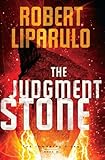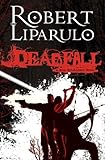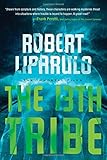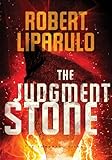|
Robert Liparulo interview with Susan Sleeman
|
|
April 09, 2012
A. I’ve been writing for publication since before my teens. I wrote magazine articles, and then became an investigative journalist, a finally moved into my true passion, writing novels. I’m a husband, father, and follower of Christ. My stomping ground is the Colorado Rockies, and besides writing, I love traveling, scuba diving, reading, and movies. Q: When did you first realize you wanted to be a writer? A. When I was 12, I read I am Legend by Richard Matheson. For about half the book, the main character, Robert Neville, tries to get a sick dog inside his home. When he finally does, he spends the night nursing. Stroking the dog, he recalls the way things used to be. The last line of the chapter was: “In the morning the dog was dead.” Not only was the dog cool, its death was symbolic of the death of life as it had once been. I started crying, and I thought, “If words—only WORDS!—can make a pretty tough 12-year-old boy cry, I want to do that.” Q: Could you give us the highlights of your professional writing career including how you got your first writing break? A. My first published piece was an article I wrote about the Concorde making its first transatlantic flight. I was in fifth grade, living in the Azores Islands, and the jet stopped there to refuel. My fifth grade teacher sent it in to a magazine, without telling them my age, and about six months later, I got a check and a copy of the magazine. That was my first break. I’ve been writing ever since. I’ve written everything from software manuals and newsletters to radio dramas and screenplays. My first novel was Comes a Horseman, published in 2005.
A: The 13th Tribe can be summed up in two words: Immortal vigilantes. But, really, it goes much deeper. It explores our struggle to grasp God’s holiness; our stubborn belief in “earning” God’s favor, though we know better; and how even our good intentions can be twisted when we insist on abiding by our own limited logic instead of God’s righteous wisdom. All of this in a story filled with action, cutting-edge technology, and complex characters—the kind of story I like reading myself. Q: Where did you get your inspiration for The 13th Tribe? A: Some time ago, I started thinking about vigilantism, frontier justice. I think most of us would say we’d do something to stop, for example, a child abuser, even if we have to go outside the law to do it (assuming all other recourses have failed). But what are the ramifications of that . . . to society? To our souls? It’s a scary door to open. The best way to examine a topic is to exaggerate it, or look at how it functions under extreme circumstances. I wanted to look at vigilantism that way: an exaggerated reason to be a vigilante . . . how far could you take it . . . what do you become if you practice it over a long period of time? You can’t think too deeply about taking the law into your own hands, about hurting people before they can hurt others, without eventually getting around to thinking about the nature of forgiveness and grace. So now there’s God, filing off the edges of my story, shaping it into something bigger than it was before. Q: What is the main thing you hope readers remember from this story? A: I hope readers will see a little of themselves in the story and realize that too often we are still striving to earn God’s acceptance when, as believers, we already have it. I hope that they feel the Tribe’s deep yearning for something many of us take for granted, God’s love. If a single reader comes to truly appreciate what he or she has in God, it’ll be worth the year and half I put into writing it. But I also want to entertain people. I want them to be caught up in the story and enjoy the time it takes it read it. If their not entertain, totally engrossed, then they’re not going to care about the characters or the adventure or deeper meaning may lie beneath. Q: What is your favorite scene/chapter from the book? A: It’s a scene I don’t want to describe here, for fear of spoiling it for readers. But it involves the protagonist, Jagger, trying to protect his son. It’s an emotional scene, and I’m very emotional about the wellbeing of my own children. I empathized with Jagger’s fear and sympathized with his torment. It’s a harrowing scene; I hope readers think so, too. Q: What inspires you to write? A. Art done well. Doesn’t matter if it’s literature, paintings, statues, music, movies—if it stills my emotions, if it’s finely layered, and well crafted, it inspires me to be just as good. Before I write, I’ll often read a few chapters of a great book, look at Michelangelo paintings, watch an especially moving scene from a movie. While I write, I listen to mostly soundtracks. I’m also acutely aware that God gave me the gift of storytelling. I don’t want to let Him down. Q: How has being a published novelist differed from your expectations of the profession? A: It’s a lot of work! When you’re on the outside, you see the lifestyle: getting to set your own hours, you get to discuss stories and characters with fellow raconteurs, travel around, experiencing life so you can write about it. What they don’t tell you about are the long hours of research and working to make a paragraph just right, the exhaustion of going from city to city on a book tour, getting to the hotel at ten and getting up at six to catch a plane to another city, all the marketing you have to monitor and nurture—bookmarks, newsletters, websites, Facebook, Twitter . . . half of my time is spent doing things that aren’t writing. Q: What advice or tips do you have for writers who are just getting started? A: Read everything. Never stop reading. In reading fiction, you’ll learn what works, what doesn’t, the structure of stories, the development of characters. Even reading magazines helps, it’ll fill your head with ideas and people and inventions, adventures and misadventures, human nature—all of it you can use to flesh out your stories, make them deep and real. Q: Would you share with us what you are working on now? A. I’m finishing up the sequel to The 13th Tribe. Its working title is The God Stone, and we find out that there’s another group of immortals, but this time they’re exponential more wicked than the Tribe. And this go-round, I open the floodgates on the supernatural and spiritual: We get to see angels and demons at work in our lives. A lot of action and suspense, and I think a unique and profound look into the spiritual realm. Q: What is something your readers might be surprised to learn about you? A. Probably that I’m as emotional as I am. Here I am, writing action thrillers, tough guy adventures; and personally, I shoot guns, do extreme sports . . . but I’ll tear up at Hallmark commercials. A break-up song can get me all choked up. When I see someone hurting, I want to hug them, to comfort them. But I think this aspect of my personality has helped me tell compelling stories. My good guys tend to be tough on the exterior, but fiercely in love and protective of their spouses and kids and people who can’t protect themselves. I have a lot of female readers, and I think it’s the undertone of love and justice and hope, the quality of my hero’s and heroine’s relationships that they relate to and appreciate. Q: When you’re not writing what do you like to do? A. I started out in college as a motion picture production major, before switching to English, so I love watching movies and analyzing them, why did they work . . . or not. I swim, workout, spend time with my family, read—of course—hike, spend time with friends. Q: Anything else you’d like to tell or share with us? A. I love to interact with readers. So if you have any comments or questions, write me. I’ll write back.
|
Warning: getimagesize(https://www.thesuspensezone.com/wp-content/uploads/2014/08/susanamazon-200×300.png): failed to open stream: HTTP request failed! HTTP/1.1 406 Not Acceptable
in /home/susans16/thesuspensezone.com/xxss_class/Utils.class.php on line 849
Warning: Division by zero in /home/susans16/thesuspensezone.com/xxss_class/Utils.class.php on line 856

 Former journalist Robert Liparulo is the best-selling author of the thrillers Comes a Horseman, Germ, Deadfall, Deadlock, and The 13th Tribe, as well as The Dreamhouse Kings, an action-adventure series for young adults. He contributed a short story to James Patterson’s Thriller, and an essay about Thomas Perry’s The Butcher’s Boy to Thrillers: 100 Must Reads, edited by David Morrell and Hank Wagner. He is currently working on the sequel to The 13th Tribe, as well writing an original screenplay with director Andrew Davis (The Fugitive).
Former journalist Robert Liparulo is the best-selling author of the thrillers Comes a Horseman, Germ, Deadfall, Deadlock, and The 13th Tribe, as well as The Dreamhouse Kings, an action-adventure series for young adults. He contributed a short story to James Patterson’s Thriller, and an essay about Thomas Perry’s The Butcher’s Boy to Thrillers: 100 Must Reads, edited by David Morrell and Hank Wagner. He is currently working on the sequel to The 13th Tribe, as well writing an original screenplay with director Andrew Davis (The Fugitive).
When not writing, Liparulo loves to read, watch (and analyze) movies, scuba dive, swim, hike, and travel. He lives in Colorado with his wife Jodi and four children: Melanie, Matthew, Anthony, and Isabella.













 Q: Let me start with asking you to tell us a little bit about yourself.
Q: Let me start with asking you to tell us a little bit about yourself.  Q: Would you tell us about your current book release?
Q: Would you tell us about your current book release?
Leave a Reply